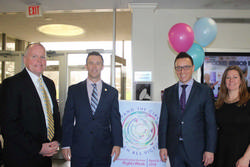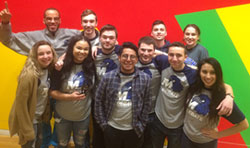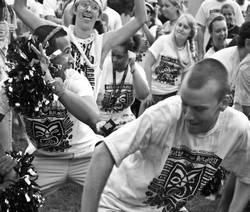The Criminal Justice Department sponsored Get Real About Sex, Consent, and Violence with guest speaker Jeffrey Bucholtz at Pollak Theatre for National Crime Victims’ Rights Week on Friday, April 13. Bucholtz is a professor of oral communication at Southwestern College. The event was cosponsored by The County Prosecutors Association of New Jersey and New Jersey Association of Victim Coordinators.
Each year, the Office of Victims Services of New Jersey leads the observance of National Crime Victims’ Rights Week on April 8 to 14. For this year’s theme, the University’s Criminal Justice Department capitalized on “Expand the Circle: Reach All Victims,” which focuses on how the victim’s field can ensure that all victims can access the proper resources and support and how professionals, organizations, and communities can work together to reach all victims.
Victim advocates, law enforcement officers, students, and non-profit agencies were all in attendance for the event. Although organized by the Criminal Justice Department, the event was open to students of all majors in order to provide a better understanding of the importance of consent and how we develop a perception of sexual violence.
The event consisted of information tables from the Prosecutor’s Offices of Mercer, Monmouth, and Ocean Counties to provide more information on their individual victim services and to give criminal justice students the opportunity to network with representatives. Other organizations included 180 Turning Lives Around, a non-profit that focuses on aiding families who have been affected by domestic violence and sexual assault.
Keynote speaker Bucholtz has been a speaker for other events with the New Jersey Prosecutor’s Offices, because the Victim Coordinators from each county revered him for his ability to connect with the audience and create a comfortable environment to discuss these pressing issues.
Bucholtz is a professor of communication at Southwestern College in San Diego, in which he teaches oral communication and media literacy. Originally pursuing medicine, he changed his course of study when he found that he could change the world in a different way.
Nancy J. Frankie, Director of the Victim Witness Unit of the Monmouth County Prosecutor’s Office, highlighted the important messages that students should take from the guest speaker to protect victims in the campus community.
“[Students should] restructure the culture, and rethink the process of how we look at victims and prevent victimization. In the first place we should look at how we educate our children, students and professional world.” Victim Coordinator Barbara Barbolini added, “Students should know where there’s help if they are a victim with the campus resources that are available.”
Christopher J. Gramiccioni, Monmouth County Prosecutor, echoed this sentiment, noting that the criminal justice system and the culture of the campus community influence one another in the representation and safety of crime victims. Regardless of one’s academic discipline, Gramiccioni stressed the importance of focusing on the need of the victims and bringing practical knowledge into these situations.
“With respect to whether you’re a criminal justice major or not, nothing substitutes time with representatives coming to you talking about their day-to-day experiences,” he said. “What I would hope is that whatever people learn here, that they spread the word across campus, to their friends, their families or other schools because [victimization] is an issue that more awareness needs to be raised for.”
After opening remarks from Provost Laura Moriarty and Gramiccioni, Bucholtz spoke to the crowd in Pollak using visual aids, group activities, and audience participation to discuss the influences that contribute to our understanding of victimization and the sexualization of violence.
“I was inspired into the work by a number of women who brought me under their wing and gave me encouragement to engaging in [advocating for victims] myself, and there were not a lot of men that were doing this work. I was frustrated that not enough men were engaged, so I felt that I needed to be,” Bucholtz said.
He has been touring the nation’s high schools and colleges with his program We End Violence, which strives to identify the cultural myths that contribute to the discrimination and violence toward vulnerable group, while creating a culture in which victims can share their stories and heal together. Through visiting schools nationwide, Bucholtz wishes to encourage students and members of the criminal justice system to take control of their environment and make a positive difference in their communities.
“It’s called collective impact modeling, which says that the way that you do social shifts is not everybody doing everything,” Bucholtz said. “What you do is have everyone do something small, altogether, and then it starts to become something bigger.”
PHOTO TAKEN by Nicole Riddle



